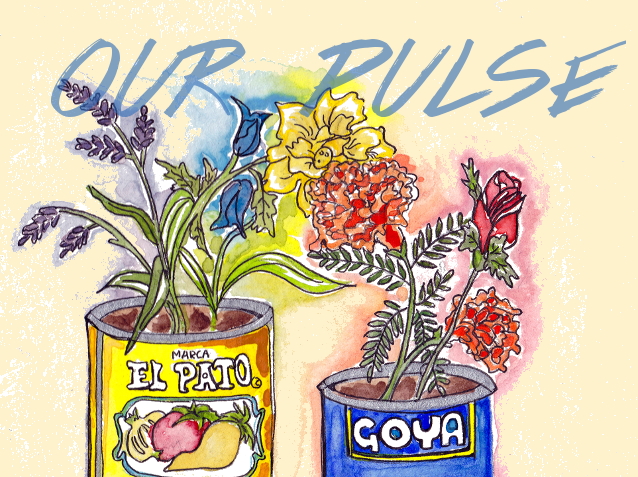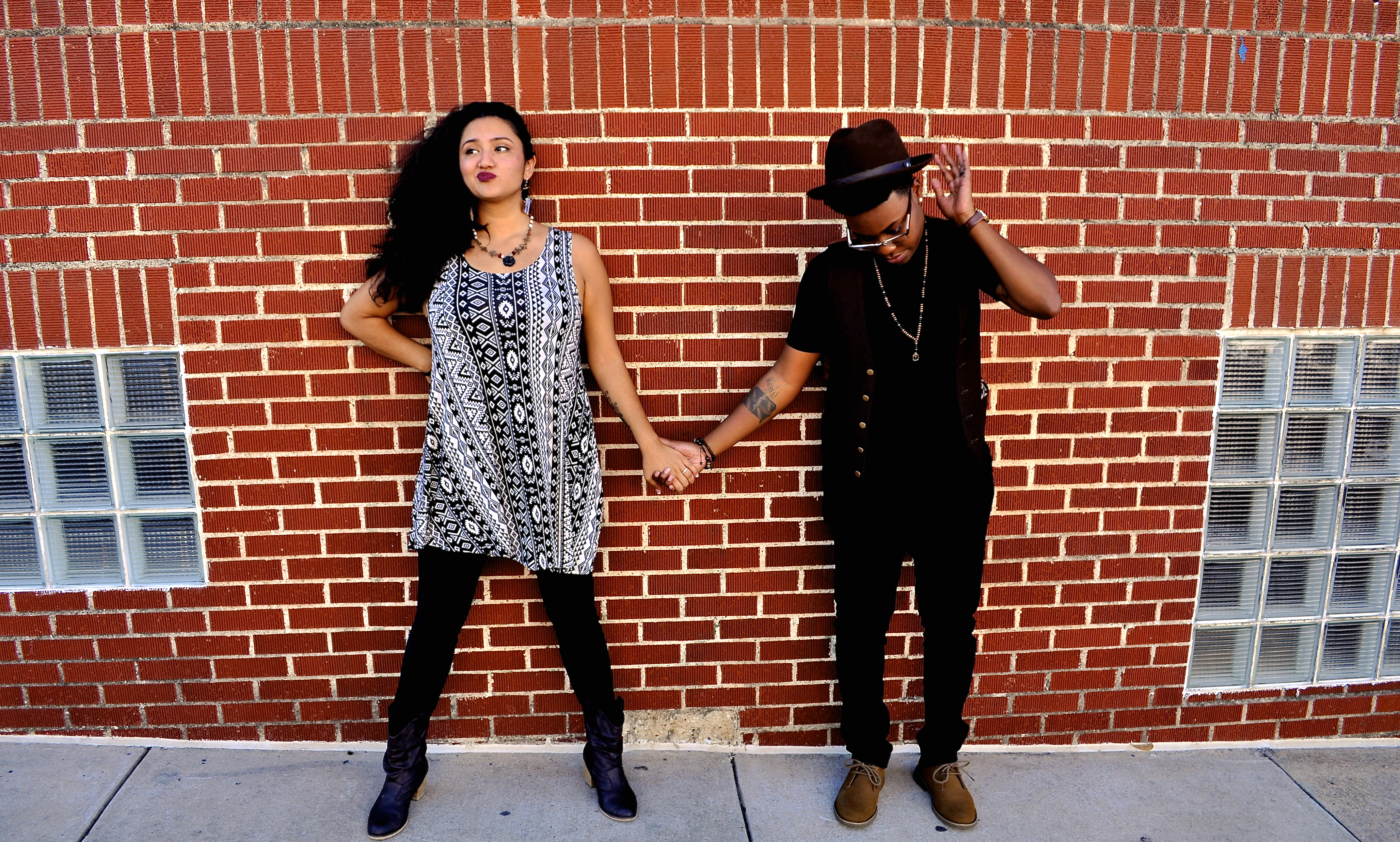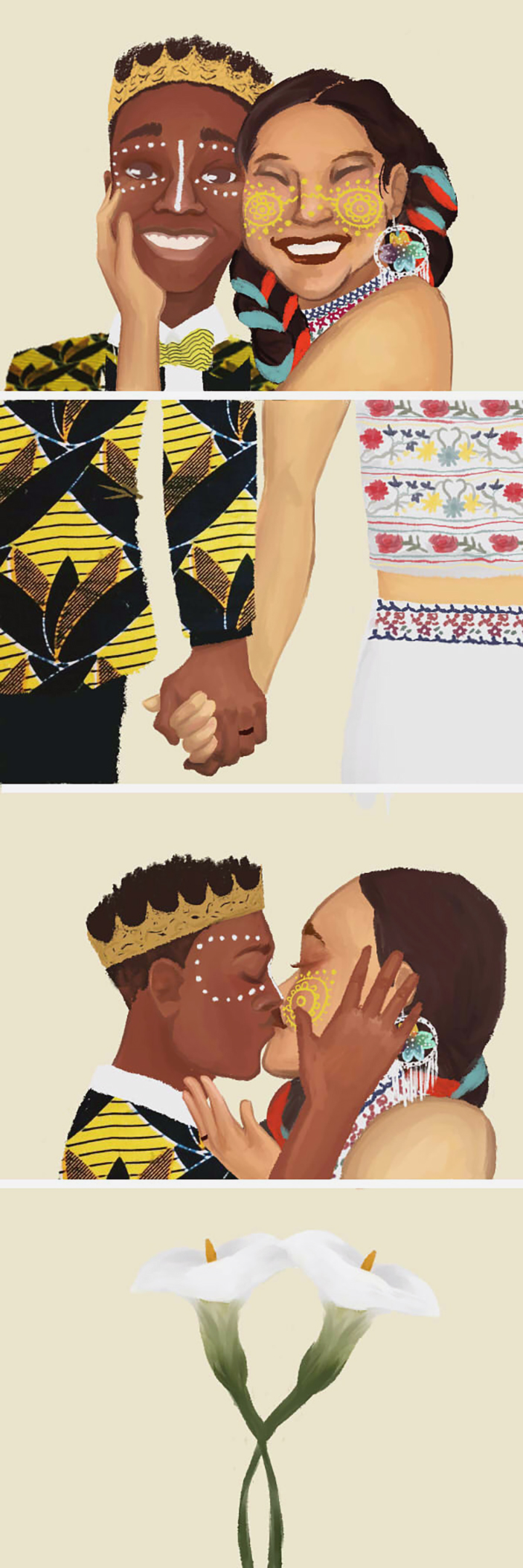
Welcome to Autostraddle’s queer Latinx essay series: Our Pulse. In honor of celebrating Latinxs during Hispanic Heritage Month, Autostraddle curated a collection of essays by lesbian, bisexual, queer and trans Latina and Latinx writers to showcase our experiences, our pulse.
I’m a 25-year-old queer, first generation Mexi-Salvadoreña, brown and hairy mestiza femme born on the east coast and living in Tejas. I share a life with a Black gender non-conforming partner who was born and raised on the south side of Chicago and who is transforming through their masculinity. We have been together four years as an interracial queer couple in a small primarily white town in North Texas. My partner is a talented body worker, jazz-loving fashionista musician, and I am a llorona pero chingona radical traveling poeta, maestra, and spiritual [art]ivista.
Around year two of our relationship, I playfully began tagging our dynamic and distinct duo as La India Y La Negrx on social media. Initially I did this as a way of documenting our beautiful and radical presence in the world (yay for the power of internet selfies and visibility politics!). Four years and countless “likes” later, our journey as #LaIndiaYLaNegrx in a white supremacist hetero patriarchal reality has grown from playful and self-affirming forms of visibility to a humbling and often times painful series of lessons on the radical decolonizing power of love and emotional literacy.

Like many other radical queer muxeres mestizas my journey into queerness was not graceful. I had no road maps, little support or mentorship, and little understanding of what was possible and what was to come from this courageous and intentional act of choosing love in such a radically beautiful form. To this day, I only recall two conversations ever had with my family of origin about queerness prior to me coming out. One was me being bold enough to ask my mother what she felt about gay marriage. Her response was that she believed marriage was only for a man and a woman. End of conversation. The second experience was with my father who, thinking himself very liberal and tolerant, explained that everyone will make their own choices; he just felt it was important that those choices happened behind closed doors and not in his face. Of course neither of these conversations stopped my queer little heart from committing to marrying a gender non-conforming person and living my choices out in the open.
Beyond this casual yet intentional dismissal of queerness, it was hard not to notice the overall aversion my families of origin had to difference in general. I still remember my tia telling me not to take interest in my cousins’ Guatemalan male friend because we would find a good Salvadorian boy for me soon enough. I imagine this was my tia’s attempt to somehow correct my father’s scandalous choice to marry and have children with a dark-skinned Mexican woman. Along with casual colorism known to many of us Latinxs and other POC, the unapologetic anti-Blackness was never missing from the dinner conversation when race was discussed. This was especially true whenever I came home from college and spoke passionately and genuinely on the need for Black and Brown people to stand in solidarity with one another. I did this loyally, only to encounter repeatedly the oversimplified myth of Black people not wanting to work while having all the privileges of citizenship and language access. This never failed to be accompanied by the story of that one time tal y tal was jumped down the street coming home from work by a group of morenos who stole his hard-earned money y “que esa gente pasan todo el dia tomados y usando drogas viviendo gratis del gobierno”. Ah, if they only they knew I was joining those morenos on summer daze in the projects down the street flowing over instrumentals and talking politics.
Yet as expected, over the years my cousins have married and procreated with other straight-identified Salvadorian or Salvadorian-Americans (usually at least as light or lighter-skinned than themselves) that come from decent hardworking families and have managed to have pretty stable lives living close to the extended family unit. Three generations in my immigrant family has transitioned pretty seamlessly to the American Dream and all that it has to offer. Now to be sure, I respectfully recognize that cultural enclaves, strong conservative family bonds, and the maintaining of cultural traditions have been vital for survival, conservation, and even resistance of many Latinx immigrant families in the U.S. Yet as a queer mujer it is imperative for me to name and recognize the ways these things have been deeply violent for many of us that dare to seek and uncover the unknown and/or the unsaid.
If I have learned anything living in this reality, it’s that the tools that come from resisting Eurocentric forms of assimilation allows us the freedom to heal, remember, and grow as a people that have inherited 500+ years of colonization and war. We grow when we resist, we resist when we believe another reality is possible. We must help one another live beyond fear into that belief. We must affirm for one another that we can change our realities one act of courage at a time.
Nothing has made this more apparent to me than my choice to invite transparent and intentionally radical love into my life in the form of my partner. By doing this I have actively rejected the idea that a conservative light skin or white middle class man will save me. By doing this, I have taken the time to uncover/remember that Black and Brown two-spirit bodies have been walking with each other since before Columbus and other European colonists invaded our lands. I have reclaimed the stories that tell us we have shared sacred prayers, knowledge, and medicine for thousands of years; we have stood together in war, and we continue to stand, fall, and walk together still.
I was in Oakland, California when I learned about the massacre at the Pulse nightclub. By then I had spent the summer mourning daily the new names of black and brown bodies that were being assassinated all over this country. I sat in a qpoc meditation circle (because The Bay) in which we took turns telling each other we were sad, angry, and over all disconnected and confused about what we were feeling or what we thought we should be feeling. It was a collective sigh of desperation that there may be no room for love in our lives seemingly dictated by fear and death. This I felt was the most violent part of all.
Above all things, I have come to believe there must be room for serious consideration of love as a political strategy and resilience practice in the lives of queer people resisting ongoing colonization and genocide. Yet such love requires intentional and constant work, just like any other activist organizing strategy.
Choosing to live unapologetically in a queer interracial relationship amidst the timeless reality of Trump politics in the South has meant choosing to be courageous. It has meant intentionally delving into the ways historical and present day trauma has stunted and damaged my perceptions of self and my capacity to love without the assistance of whiteness or cis maleness. I struggle daily with the manifestations of personal trauma that affect my day to day ability to be kind, compassionate, patient, confident, vulnerable, and nurturing in my relationship. These are all skills I now know are necessary to maintain a loving and healthy partnership. These are all also skills that have been affected by multiple forms of violence. From internalized self-hate rooted in racism and homophobia, to emotional neglect, to alcoholism; the genealogies of trauma are revealing of the ways many of us have unlearned the power of love for more then seven generations.
Over these four years I have yelled different versions of “I don’t need this shit, I’m leaving!” many times over. I have done this only to humbly come back and uncover my visceral responses as manifestations of past experiences. Choosing my relationship with my partner meant choosing to intentionally be committed to this painful work (yay for counseling, literary resources like bell hooks, and long conversations with supportive friends!). I have come to understand that the emotional labor required of me in this relationship is endless and all encompassing. It means learning to understand my oppression as a mestiza mujer and also learning how to work through my anti-Blackness and be an ally to my Black gender-nonconforming partner. This has been truly painful, messy, and overwhelming. Yet at the end of the day, it’s the work I believe truly matters. This is healing work that I choose to do for myself, my beloved, my community, and the lineage of mujeres behind me and in front of me that are hungry for love and reconciliation of the violence that surrounds us.
Yet, as romantic as it sounds to engage love and partnership as a political practice, I would argue it might be the most difficult form of activism. At the end of the day there is nowhere to hide, no room to make excuses and justifications, no email to send that might buy you time. Love as activism for qpoc requires a great deal of humility, painful honesty, and endless courage on the most personal of all levels. It’s the ultimate form of accountability that I have encountered in my living. It requires you to take inventory of the things you have avoided in your life, the things you never had words for or the courage to sort through. It requires you to own up to your choices, your words, your action on and off screens, on and off microphones or megaphones. Love in partnership as colonized/racialized bodies is courageously undressing the walls we have built to survive and showing others the chaos that war has left behind.

I by no means claim to be an expert on this work or even greatly successful at it. I say this as I recall all the past and recent heartbreaking situations where I failed at embodying the politics of decolonizing love with people I truly care about. However, if you were to ask me now what I am most proud of I would tell you it is my dream to continue becoming a person I never saw or imagined I could be: a mujer free and whole, emotionally stable and grounded, living in love that is inexhaustible and without condition. As far as I can tell, these desire are not included in the makings of a fabricated “American Dream”. The dream that my parents so desperately hoped would save me. Yet ironically there is nothing like standing on the intersections of everything this country hates only to realize what this country or any other historically white institution is not capable of giving you: love. Love is something we must be courageous enough to choose for ourselves.







